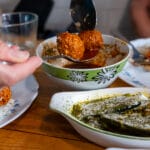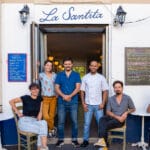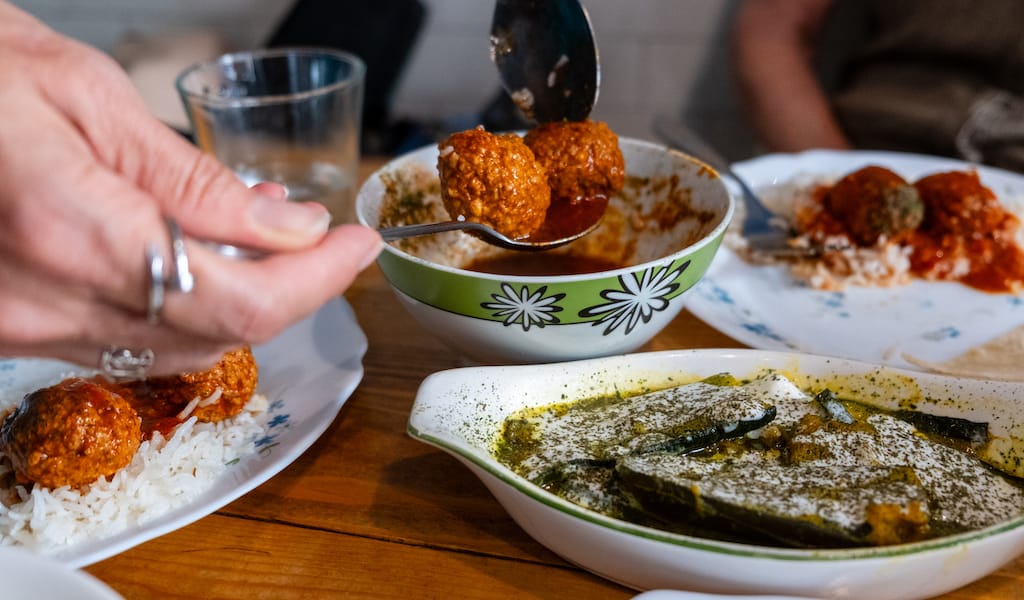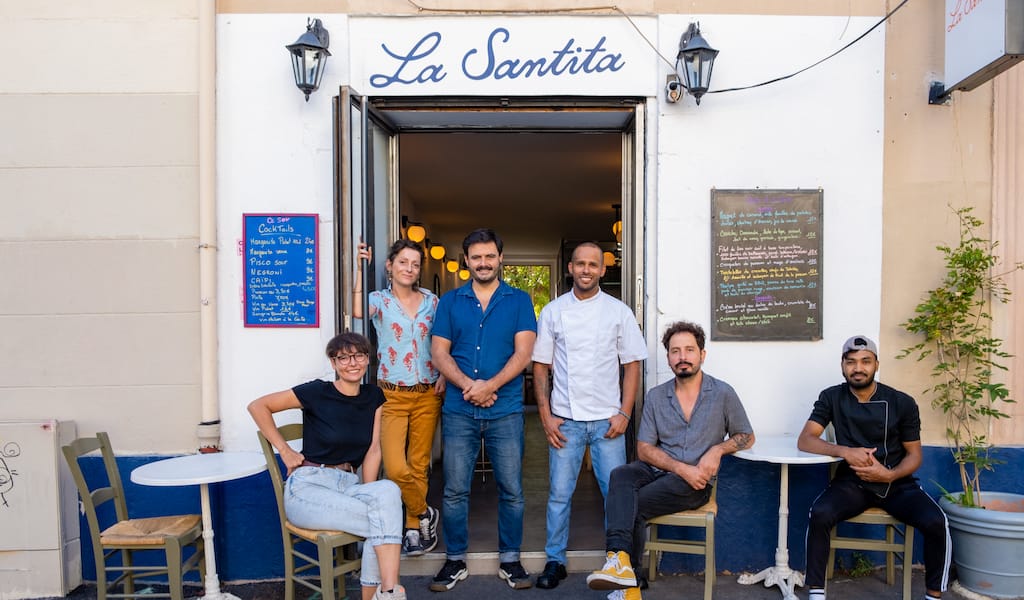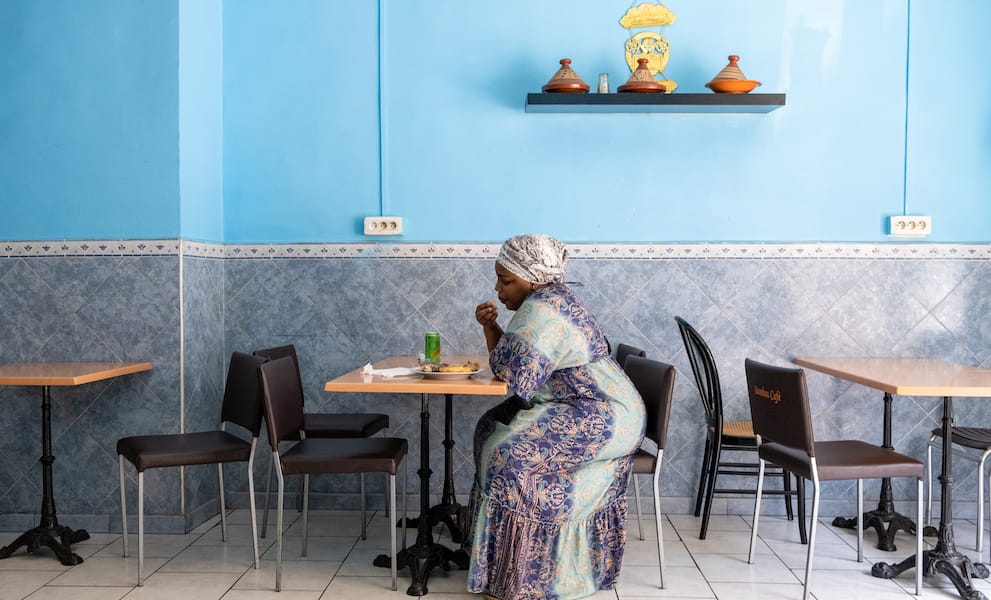At a booth bathed in the winter sun, a group of coworkers happily munch burgers and frites. Behind them, a toddler claps with glee as his mom hands him a meal in a colorful box. Two teens bypass the counter to punch in their order at the giant phone-like kiosk. Customers in cars wait in line at the drive-thru. Despite all these trappings of a fast-food joint, and the Golden Arches on the sign outside, this is no McDonald’s. Even if it was born from one.
L’Après M is a fast-food restaurant, professional integration project, food bank, and community center, all rolled into one unique spot. Its name (the M stands for “McDonald’s”) refers to its previous tenant. When the burger behemoth’s franchise owner tried to close the McDonald’s and sell this 30-year-old locale, the activist staff fought the sale, miraculously won, and repurposed the space to serve the community beyond burgers. This remarkable story mirrors that of Marseille itself, a rebellious city that has become a social innovation capital due to a lack of local funds and an ineffective local government. Like Marseille’s underdog football club, l’OM, versus the Qatari-oil-fueled Paris Saint-German, this is a David vs. Goliath tale – a small fry against a supersized corporation. Ironically, this former McDonald’s used to be an essential part of the neighborhood.

Located in an industrial part of the Quartiers Nord, the marginalized and misunderstood northern quarters of Marseille, McDonald’s chose the site for its proximity to highways and the lack of other eateries. Socioeconomics also played a part. To counter their “bad-for-you” image in France, the American conglomerate tried to “do good” by putting franchises in impoverished neighborhoods. When this McDonald’s opened in 1992 on the busy roundabout straddling Sainte-Marthe and Saint-Barthélemy, the franchise provided much-needed jobs for local youth to swap drug deals for Happy Meals. It was a “social shock absorber,” explains Salim Grabsi, a teacher who worked here as a kid, and played a big part in planting the seed for L’Après M.
Sixteen-year-old Kamel Guemari was one of the buffered adolescents. A Marseillais of Algerian descent, he discovered McDonald’s when they came to his housing projects, La Savine, to foster community ties. Guemari understood they offered a path for a better future and applied for a job. Though he stumbled along the way, he built up his self-confidence and worked up the ranks to manager.

As the only café open in a sea of kebab shops, with free Wi-Fi to boot, this particular McDonald’s served as a much-needed third place (a social hub separate from home and work) for the neighborhood. Many of the employees worked there for over a decade. “It wasn’t just a side job for a student, but a way to feed your family,” shares the now 41-year-old Guemari. He became the rep for the local labor union, advocating for better insurance and wages. The franchise grew to become the second-largest employer in the area. So it was a shock when the owner decided to sell in 2018. The staff battled in court for over a year and a half, citing workers’ rights and the restaurant’s aid to the community. Their victory in December 2019 was short-lived when McDonald’s still put the franchise under liquidation and fired the employees.
Then, the pandemic hit. Many in the neighborhood weren’t just battling Covid-19 – they were fighting to put food on the table. Recognizing they had an empty space and working kitchen, Guemari, other employees, and a slew of volunteers turned the vacant McDonald’s into a food bank in the summer of 2020. Financial and food donations poured in so they could feed 14,000 people per week via boxes of essential goods and fresh produce as well as hot dishes like couscous. The savvy activists even started an UBER Solidaire (social service Uber) delivery service for those who couldn’t leave their homes. All this took place without McDonald’s permission, and with the helping hands of hundreds. Students, parents, artists, architects….volunteers of all ages from across Marseille were galvanized by the project, whose civic-mindedness was particularly poignant amid a worldwide crisis.

This collective spirit hatched L’Après M in December 2020. L’Après M refers to “After McDonald’s,” an acknowledgement of the past while looking towards the future. “Created by the people, for the people,” Guemari extolled at the inauguration. The “Après” also stood for “L’Association de Préfiguration pour un Restaurant Économique et Solidaire (The Association for the Prefiguration of an Economical and Social Impact Restaurant).” It would take two years for the burger griddles to fire up again. For that, they needed to raise over a million euros.
While enigmatic Guemari is the voice and face of L’Après M, there are a core group of volunteers that are essential to the association’s operations. One, Fathi Bouaroua, brings 11 years of expertise as the former director of the Fondation Abbé Pierre, one of Marseille’s biggest nonprofits. (Coincidentally, Guemari is oft compared to the militant priest for their like-minded humanitarianism and long beards.) In May 2021, Fahti proposed they create a SCIC, a Co-operative Company of Collective Interest, via a crowdfunding campaign at 25 euros per part (share) and 50 euros for a part suspendu to pay for a supporter who had the enthusiasm, but not the means. Their anticapitalist efforts resounded with Mayor Benoit Payan, Marseille’s new socialist mayor. The city bought the building from McDonald’s for 650,000 euros in July 2021, slicing L’Après M’s financial burden in half.

As the money trickled in, L’Après M kept making waves. In the parking lot, volunteers built a shipping container-village to make the food bank a permanent fixture. At the start of 2022, L’Après M’s exterior was painted by local artists using leftover paint from murals on the nearby autoroute, a vivid pink and blue phoenix rising from yellow and red ashes. Festive occasions like a giant couscous dinner and one year anniversary party gathered crowds that embodied Marseille’s diversity. These events fostered connections in a fractured city that can be more millefeuille than melting pot for disparate communities. During the anniversary party, we sat with a Maghrebi couple that lived nearby, discovering our shared origins (they and my partner’s mom both born in Tunisia) as we munched on grilled merguez.
Journalists, government officials, and nonprofits from near and far came to see Marseille’s social innovation darling (NPR did a fantastic podcast here.) Instead of photo ops, Guemari preferred to have visitors “put their stone in the edifice.” This was the case when we swung by during our weeklong Culinary Backstreets Marseille trip in October 2022. Our group of eight joined L’Après M volunteers to plant Provençal aromatics (thyme, rosemary) and fruit trees (oliviers, citronniers) in the parking lot for future community meals. True to the collective spirit of the space, a local city councilman even swung by to donate seeds when he heard about the garden project.

Two months later, the efforts of hundreds of volunteers and thousands of hours paid off. L’Après M started slinging burgers on December 10, 2022. When we went to test it out one wintry January day, there was a decent-sized lunch crowd despite the chilly mistral wind. “What do you recommend?” we asked the two cashiers, complimenting one on her cherry red lipstick that matched the “M” on her logoed tee shirt. They responded in unison, “The OVNI.”
L’Après M’s signature sandwich was created by local chef Gérald Passedat. The city’s first 3-Michelin-star chef has worked for decades to elevate Marseille’s food scene, so designing a “fastronomique” burger for this innovative le fast-food was rather fitting (note: his elite Le Petit Nice is perched above a public beach, a prime example of Marseille’s contrasts.) “I really like the social impact and job training side of the project. And how it thumbs its nose at a big company,” he shared in the local paper.

When Guemari first met Passedat, he didn’t dare to ask the reputed chef for help. “I think he was worried our worlds, the Quartiers Nord and the south, were too dissimilar, but there isn’t a difference when you’re united over the same passion,” shared Passedat. In fact, the Marseille-born chef spent a lot of time as a kid on his aunt’s farm in nearby Saint-Jerome. Now 62, he’s “at an age to pass down my savoir-faire to those who deserve it” like doers at Après M. More than just recipes, Passedat has instilled the métier’s other essential ingredients to the staff: a good work ethic, self-respect, and health and safety measures.
The idea for the OVNI came from a customized cast iron pan that resembles a panini maker. In it, a regular burger is transformed into a UFO (OVNI = UFO in French), stamped with “Après” on the top for good measure. In addition to retaining the burgers’ heat – and being quite adorable – the spherical bun tidily holds in all the ingredients, so your fingers don’t get covered in sauce. For the French, who are known to eat burgers with a knife and fork, this is a real plus! The unique cooking method makes the buns deliciously golden brown on the outside and pillowy in the middle. It also helps that they are baked fresh by two young bakers in nearby Le Canet, who have recently opened a boulangerie to stock other restaurants.

The OVNI boeuf comes with ground beef, tomatoes, organic lettuce from the nearby Paysan Urban farm, and a special sauce made with caramelized onion gravy, the onions “well-browned until they are addictive,” explains Passedat. The chef’s passion for the sea inspired the OVNI poisson, with hake (chosen for its affordability), red cabbage slaw, and a creamy sauce of curry, chickpeas, and fennel, “oriental flavors for Marseille, the Porte d’Orient (the gateway to MENA).” Made with fresh meat and fish and house-made sauces, both sandwiches live up to their reputation. We’re big fans of the fish, but it hasn’t sold as well due to Marseillais’ surprising aversion to fish. “The whole world is more into meat,” Passedat acknowledges. For those who are more partial to veggies, L’Après M has just added a vegetarian, falafel-style burger by another local chef, Clement Flint, of solar-powered Le Présage.
The rest of the menu resembles the former tenant, with Marseille-inspired names to add local flavor. Instead of a Big Mac, order a Maouss Costo (using the Provençal spelling of costaud – “beefy”). The chicken sandwich is named Galet’ for the smooth rocks that blanket some of the city’s beaches. Kid’s meals are called Menu Minot (Marseille slang for kid). With its crispy, tender chicken, the Galet’ is our favorite. We also like it in the wrap with bacon, recommended by another staff member, and popular in Marseille for its likeness to our ubiquitous kebabs.
For dessert, a giant serving of crème glacée (soft serve ice cream) comes with your choice of caramel or chocolate sauce plus toppings: M&M’s, Oreo cookies, or Daims, the crunchy Swedish chocolate & caramel bar popular across Europe. Stuffed from our sandwiches, we try to leave out the toppings, but the friendly cashier insists we indulge.

Pricewise, L’Après M’s menu is a bit cheaper than McDonald’s, save for the OVNI, which only costs 1 euro more than a Big Mac. An impressive feat for a local eatery that doesn’t benefit from the cost savings of big conglomerates. And even though they use the same suppliers, we think the food tastes better at L’Après M. Perhaps because, as the takeout menu says, each sandwich is “Made locally with mutual aid, interactions, and job training” – ingredients that do your conscience good.
Half of the workers are part of the professional integration program. A key component of L’Après M’s social-impact ethos, this initiative also gets essential government aid to cover operation costs. To get a comprehensive training, the 20 participants work in each position where “they learn self-confidence, how to work as a team, even simply to wake up on time,” explains the project manager, Pascale. The intensive program members also get French classes and tech training. The rest of the staff are former McDonald’s employees who are eager to be back working again with familiar faces. Fifty-three-year-old Nour is excited that they are their “own bosses.” He proudly shuttles trays of food to each table so no one has to wait in line.
Regardless of their background – which is a multicultural mix (“Like Marseille,” beams Guemari) that includes Ukrainian, Algerian, and Nigerian backgrounds – every staff member shares a collective pride. From the former prisoner who mans the fry station to the marketing student who presses OVNIs and fastidiously cleans the counter, there is a real sense of respect and teamwork. “We’re here to lend a hand, not point fingers,” shares Tony, one of Guemari’s co-workers then and now. He reaffirms L’Après M’s goal to “revitalize the neighborhood while restoring confidence.” Ironically, this was McDonald’s goal since they opened here.

The Golden Arches’ arrival in France was an uphill battle. One between globalist American fast food and nationalist French culinary tradition that reached its climax when mustachioed farmer Jean Bové and fellow militants bulldozed a rural McDonald’s in 1999. To fit in on foreign soil, McDonald’s France sourced local ingredients and emphasized hiring youth for brighter futures. They improved their image by swapping the logo’s red for green to connote healthiness and the “I’m loving it” slogan to “Come as you are” to embrace inclusivity. France is now the company’s second-most profitable market in the world because the marketing-savvy multinational made an effort to speak local.
Things got lost in translation in Marseille.
The rise of Guemari and his comrades found McDonald’s social promise had a glass ceiling, one which shattered when the local franchise owner chose increasing profit margins over boosting a marginalized neighborhood. L’Après M isn’t anti-McDonald’s. It offers a community-minded alternative to corporate quick-service options in a globalized world that is hungry for local. The two are inextricably linked, with the latter having inspired the former’s form and function.
Jean Bové, the aforementioned activist, was at L’Aprés M’s inauguration when they installed their sign, er, “work of art” (to avoid copyright infringement). Fashioned from the old McDonald’s signage, they cleverly flipped the “d” to make a “p” and used an upside-down “a” as an “e.” They even juggled the words of the slogan, a wink to the French reverse-syllable slang verlan (l’envers – inverse), to say “Comme vous êtes, vous venez” (“As you are, come.”) At first, that doesn’t seem that different from “Venez comme vous êtes” (“Come as you are”). Yet, it puts the emphasis on you – the staff, the customers, the community. Not coming to fill the corporate coffers. We’re loving that.
L’Après M is still raising money here. Your support is welcome wherever you are.
Published on April 11, 2023
Related stories
April 19, 2024
MarseilleAt the end of a long wooden table, a foursome passes colorful plates of food: mouthwatering meat dumplings in tomato sauce, sauteed zucchini topped with minty yogurt, and rice flecked with cumin. Sitting across from a refrigerator, below a row of fake potted plants, and beside shelves stacked with mismatched plates, they could be dining…
November 7, 2023
MarseilleWe all have our favorite watering hole – that place close to home where you can have a bite to eat, sip on your preferred drink, have a chat with neighbors, friends, strangers. A place where you feel welcome and frequent often. La Santita, a tiny Latin American restaurant located on the tree-lined Boulevard Eugène…
June 29, 2023
MarseilleItalian and Maghreb restaurants are undoubtedly the stars of Marseille’s food scene. In fact, Marseille is so chock-a-block with pizza it’s rumored to have more pizzerias per capita than New York City. Eateries dishing out copious bowls of couscous equally abound. Meanwhile, some of the diverse city’s most prominent immigrant communities – and their cuisine –…

















































